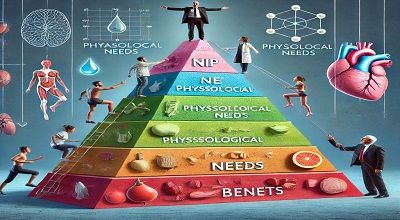Physiological Needs
Maslow’s Hierarchy Theory of Psychological Needs was proposed by Abraham Maslow in 1943. According to Maslow, human needs are arranged in a hierarchical order. With each level building upon the previous one. The hierarchy is often depicted as a pyramid with five levels. Physiological needs represent the foundational level of the hierarchy.
Physiological Needs:
- Definition: These are the basic survival needs that must be satisfied for an individual to survive and function. They include:
- Air: Oxygen is essential for breathing.
- Water: The body requires water for hydration and various physiological functions.
- Food: Adequate nutrition is necessary for energy and sustenance.
- Shelter: Protection from the elements and a secure environment.
- Sleep: Sufficient rest is crucial for physical and mental well-being.
- Clothing: Protection from the elements and maintenance of body temperature.
- Role in the Hierarchy: Physiological needs are the most fundamental and must be satisfied before an individual can move on to higher levels of needs. If these needs are not met, they take precedence over all other considerations. And the individual’s primary focus is on securing these necessities.
Maslow’s Hierarchy of Needs suggests that once physiological needs are satisfied. Individuals progress to the next level of needs: safety needs. The hierarchy continues with levels for love and belonging, esteem, and self-actualization, with each level representing higher-order psychological needs. It’s important to note that individuals may move back. And forth between these levels depending on their life circumstances.
This theory has been influential in various fields, including psychology, education, and management, providing insights into human motivation and behavior. However, it’s worth acknowledging that individual experiences. And cultural variations can influence how people prioritize and pursue these needs.
Benefits of Psychological Needs
Meeting psychological needs is crucial for overall well-being and optimal functioning. Abraham Maslow’s Hierarchy of Needs highlights the significance of psychological needs in the broader context of human motivation and development. Here are some benefits associated with satisfying psychological needs:
Emotional Well-Being:
- Fulfilling psychological needs contributes to emotional stability and a positive mental state.
- Emotional well-being is closely tied to the satisfaction of needs related to love, belonging, and esteem.
Motivation and Goal Pursuit:
- When basic psychological needs are met, individuals are more motivated to pursue higher-level goals.
- Satisfaction of needs provides a foundation for setting and achieving personal and professional objectives.
Resilience and Coping:
- Individuals with satisfied psychological needs tend to be more resilient in the face of challenges and better equipped to cope with stress.
- A strong social support system, derived from satisfying love and belonging needs, can enhance coping mechanisms.
Healthy Relationships:
- Meeting needs related to love and belonging fosters healthy interpersonal relationships.
- People are more likely to form and maintain positive connections with others. When their social and emotional needs are fulfilled.
Self-Esteem and Confidence:
- The fulfillment of esteem needs, which includes recognition and a sense of accomplishment, contributes to the development of self-esteem and confidence.
- Individuals who feel valued and respected are more likely to have a positive self-image.
Autonomy and Self-Actualization:
- Meeting higher-level psychological needs, such as the need for self-actualization. Allows individuals to express their creativity, pursue personal growth, and achieve their full potential.
- Autonomy, or the ability to make independent choices, is facilitated when lower-level needs are satisfied.
Improved Mental Health:
- Psychological needs are closely linked to mental health. Satisfaction of these needs can contribute to a reduced risk of mental health issues.
- Conversely, unmet psychological needs may be associated with stress, anxiety, and depression.
Increased Productivity and Performance:
- Individuals who have their basic needs met are often more focused and productive in their personal and professional lives.
- Satisfied psychological needs contribute to a positive work environment and improved performance.
Enhanced Learning and Creativity:
- In educational settings, meeting psychological needs is associated with improved learning outcomes and increased creativity.
- Students who feel a sense of belonging and have their esteem needs met are more likely to engage in learning activities.
Overall Life Satisfaction:
When psychological needs across the hierarchy are satisfied. Individuals are more likely to experience a sense of fulfillment and satisfaction with life as a whole.
Understanding and addressing psychological needs are essential for promoting mental health, fostering positive relationships, and supporting individuals in their personal and professional pursuits.
Read More =====> Educational Psychology & Its Types
Must Read =====> Psychological Behavior in Education
